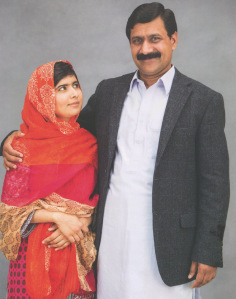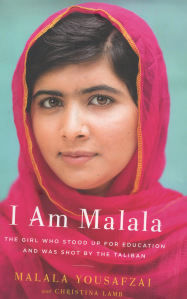
Ziauddin Yousafzai, a proud Muslim father of his daughter

There are great men living among us, but sometimes it take an epic event for their presence to be known outside their limited geography.
Rarely do men take the lead in fighting for women’s rights. But I have just read about a man who has been fighting for women’s rights for his entire life. That man’s name is Ziauddin Yousafzai. Ziauddin is the Pakistani father of the very famous Malala Yousafzai, his daughter, and the courageous young woman who stood up for the education of girls in Pakistan. As a result, Malala was shot in the head by a member of the Taliban.
As you might have guessed, I just read “I AM MALALA.” It’s an outstanding book that I recommend to everyone. There is no more worthy book being sold today.
Malala is an exceptionally brave young woman. But, her father was more brave. There could have been no Malala without Ziauddin, a man of astounding courage who has fought for his entire life for the education of all children in Pakistan, boys and girls. When Malala was born, no one in the family was happy because she was a baby girl. But Ziauddin stunned all by not only being happy about his daughter’s birth, but was extremely vocal about his pride to be the father of a daughter. He insisted that his daughter be included in the family tree, much to the horror of other family members. (Sadly, in most of the Muslim world, when daughters are born, everyone goes quiet with grief. When sons are born, celebrations go on for days.)
And so from the beginning of her life, Ziauddin’s daughter was lavished with love, attention, and books. From the moment she reached the age of understanding, she knew that her father “had her back” and he would fight to the death to ensure that she, a mere girl in other’s eyes, would be treated equally with her two brothers. And so Malala grew into her teenage years feeling confident that she had the right to speak her mind, to study, to learn, and to have and pursue dreams. Ziauddin had taught his daughter how to struggle against injustice. And Malala learned how powerful a person can be who speaks out against injustice. Every child born deserves such a life.
When reading this book, I adored Malala, and I marveled at Ziauddin. He grew up at a time when women’s feelings were not even considered, yet he respected women, and was proud to express his respect for females, insisting that his school be open to girls, too.
Ziauddin is not only passionate and confident with his beliefs, but he is exceptionally wise about many aspects of life. Here are just a few tidbits in the book shared by Malala: “My father also loved to write poetry, sometimes about love, but often on controversial themes such as honor killings and women’s rights.”
When a Mullah in their village started a campaign against Ziauddin’s school, open to girls and boys, Ziauddin was not afraid to fight back, telling others, ’Nim Mullah khatrai iman’ or, “A Mullah who is not fully learned is a danger to faith.” (After living in the Muslim world for many years, I KNOW that it takes extraordinary courage for anyone to speak out against a Mullah. Even powerful kings and dictators chose their words with care when addressing or discussing a Mullah!)
When a doctor’s clinic was closed by the Taliban, the doctor approached Ziauddin for advice after the Taliban later offered to reopen the hospital. Ziauddin advised his friend, “Don’t accept good things from bad people.” He didn’t believe that a hospital protected by the Taliban was a good thing. He was right, and not afraid to speak out against the brutal Taliban.
When the Taliban first came to their valley (SWAT) many people welcomed them with open arms, much to Ziauddin’s dismay, for he knew they were wolves in sheep’s clothing. Later after the Taliban completely took over and began to murder many people, everyone was forced to flee. When they returned to their village, they found a letter from a Pakistani soldier condemning the villagers for allowing the Taliban to gain control Swat. Ziauddin told his daughter, “This is typical. We people of Swat were first seduced by the Taliban, then killed by them and now blamed for them. Seduced, killed and blamed.” In fact, Ziauddin was being generous. He was never seduced. In fact, he fought against the Taliban from the first day until the last.
When Ziauddin received death threats from the Taliban, he refused to give up his activities to educate children or to stop warning his friends against cooperating with the Taliban. Even after his friends were shot in the face by the Taliban, he kept on course. Everyone believed that Ziauddin would be next.
But it was his daughter who was shot.
After the attempted murder of Malala, Ziauddin ”…argued that all he had ever wanted was to create a school in which children could learn….” “My only ambition,” Ziauddin said, is to educate my children and my nation as much as I am able. But when half of your leaders tell lies and the other half negotiating with the Taliban, there is nowhere to go. One has to speak out.”
Although Ziauddin was unusually courageous, he was often frustrated, once saying, “I have a school, but I am neither a khan nor a political leader. I have no platform. I am only one small man.”
I beg to differ: Ziauddin, you are NOT a small man. You are a lion of a man, the greatest of men, one of the most courageous men I’ve ever had the pleasure to read about — a man unafraid to go against entrenched ideas and prejudices fully embraced by your society.
When Mala’s mother continued to believe that women should not go out of the house, and should not speak to any man not of her family, Ziauddin told his wife: “Pekai, purdah is not only in the veil, purdah is in the heart.”
Ziauddin kept a famous poem (written by Martin Niemoller, who lived in Nazi Germany) in his pocket:
First they came for the communists,
and I didn’t speak out because I wasn’t a communist.
Then they came for the socialists,
and I didn’t speak out because I wasn’t a socialist.
Then they came for the trade unionists,
and I didn’t speak out because I wasn’t a trade unionist.
Then they came for the Jews,
and I didn’t speak out because I was not a Jew.
Then they came for the Catholics,
and I didn’t speak out because I was not a Catholic.
Then they came for me,
and there was no one left to speak for me.
I have discovered that it is very difficult to bring change to our world. And, as hard as women might fight against abuses, we cannot bring this kind of massive social change until men stand by our side. If only every thinking men would come forward like Ziauddin Yousafzai to fight for women’s rights. If only every man would live as Ziauddin Yousafzi has lived, soon we could defeat the abuses man inflicts upon women.
Ziauddin Yousafzi is a modest man, calling himself a “small man,” but in fact he is one of the greatest men ever to walk this earth.
We should all nominate Ziauddin Yousafzi for next year’s Nobel peace prize, and for the TIMES man of the year. We need to hold him up as the kind of hero young boys should emulate.
Ziauddin is a real man.


 newest »
newest »
 newest »
newest »
 I'm glad you are reading it, too, Ashi... It's a GREAT book. Christina Lamb did a marvelous job bringing Malala's true self to the page. And, Mr. Ziauddin Yousafzi is indeed a "universal father" for all the girls on Earth, as you say. We must nominate him for a special recognition. I think I'll try to get something started online. I'll post what I come up with, but there is no reason we can't have come up with a good idea and name him as the winner of the prize! I think TIME should nominate him for MAN OF THE YEAR. What he did was very unusual for the area, and, extremely dangerous. Few men would do what he did. Others may love their daughters, but they keep their head down and don't vocalize it very much due to the reaction from society.. Let me know what your ideas. For now, have a lovely day, Ashi...
I'm glad you are reading it, too, Ashi... It's a GREAT book. Christina Lamb did a marvelous job bringing Malala's true self to the page. And, Mr. Ziauddin Yousafzi is indeed a "universal father" for all the girls on Earth, as you say. We must nominate him for a special recognition. I think I'll try to get something started online. I'll post what I come up with, but there is no reason we can't have come up with a good idea and name him as the winner of the prize! I think TIME should nominate him for MAN OF THE YEAR. What he did was very unusual for the area, and, extremely dangerous. Few men would do what he did. Others may love their daughters, but they keep their head down and don't vocalize it very much due to the reaction from society.. Let me know what your ideas. For now, have a lovely day, Ashi...








Mr. Ziauddin Yousafzi is a REAL man of honour.
This post is great Jean.
I'm so glad this is the book that I'm reading currently :).